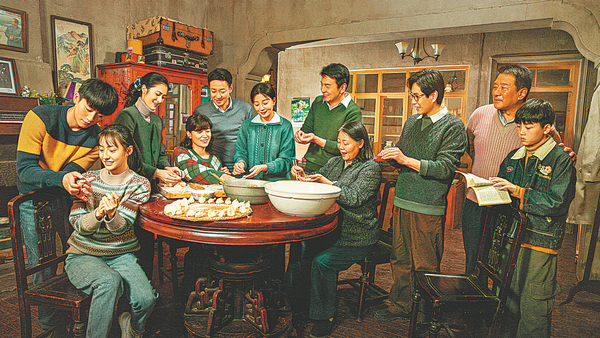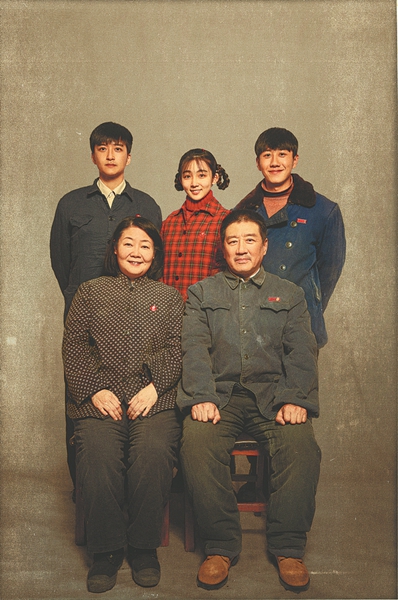The past is another country

A scene from the TV drama A Lifelong Journey shows three generations of a family in Northeast China celebrating Spring Festival by making dumplings. CHINA DAILY
Family saga revisits different era to find out how we got here, Wang Qian reports.
The year is 1969 in China's Northeast. When Zhou Zhigang, a construction worker, is dispatched to engage in a large-scale infrastructure project in Southwest China, his eldest son and daughter become zhiqing, a term referring to educated youth sent to the countryside, leaving the youngest son and his mother at home.
Focusing on the ups and downs of Zhou's family over five decades, realistic drama A Lifelong Journey has been a huge hit on TV and online, evoking nostalgia among many viewers, especially those born in the 1960s. It premiered on China Central Television and streaming platform iQiyi on Jan 28.
Rated 8.1 points out of 10 by more than 47,000 users on review platform Douban by Monday, many viewers describe the show as a time machine to drift into the past, reflecting how we got here.
Adapted from Liang Xiaosheng's award-winning novel of the same name, the 58-episode show explores themes of family, friendship and romance in a bittersweet story. Given that A Lifelong Journey is set in the 1960s, it's not surprising that the family has to deal with lots of social changes and turmoil, like the resumption of gaokao (the national college entrance exam), the country's reform and opening-up, the zeal for xiahai ("jumping into the sea" or becoming self-employed in private business) and the nation's anti-graft campaign.
"China has witnessed dramatic changes over the past five decades and it is time to create such a drama to remember the bygone times," the show's director Li Lu says. The 56-year-old director became well-known for his anti-corruption series In the Name of the People that was released in 2017.
With questions about happiness and father-son relationships still at the forefront of discussions today, Li says he hopes that A Lifelong Journey can stand the test of time.
Disney has announced that it has acquired the drama series for a release internationally on its streaming platform Disney Plus this year.
"There is tremendous appetite globally for high quality Asian content and original stories with great cultural resonance. We will continue investing in the best content and collaborating with the most sought-after creative talent and storytellers in the region so they can shine on the world stage," British magazine Tatler quoted Jessica Kam-Engle, head of Disney's content and development in the Asia-Pacific region, as saying last month.

A family photo taken in 1969 shown in the series. CHINA DAILY
Details matter
With the majority of the narrative taking place in a shantytown, Guangzipian, where Zhou's family lives, the show takes viewers down the memory lane for its engaging plot and mesmerizing characters.
To create the neighborhood, the shooting crew built a set covering 8,000 square meters in Changchun, Jilin province, collecting many old items, such as vintage televisions and calendars, to re-create the past. The clothing, like Lei Feng-style hats, and interior spaces, also play an integral part, changing with time as the plot develops.
In the set, the Guangzipian neighborhood consists of five streets-Guangren, Guangyi, Guangli, Guangzhi and Guangxin-representing ren (benevolence), yi (righteousness), li (courtesy), zhi (wisdom) and xin (trust), the five virtues in Confucianism.
The virtues can be found in the lead character Zhou Bingkun, the youngest son played by Lei Jiayin. Lei, who was born in Northeast China's Liaoning province in 1983, says he can almost "see his father" in the script.
In the show, Zhou Bingkun used to be a factory worker. Although not good at studying at school as his elder brother and sister, he is the one who has taken care of the big family. He always does things for the family and friends selflessly.
"I was born in Changchun and spent my childhood there. I have met many blue-collar workers like Zhou Bingkun, who have been gradually neglected by society," Li says, adding that his younger brother, now a journalist, used to be a worker at Sinopec Jinling Company in Nanjing, Jiangsu province.
"Shooting a TV series that can reflect the life of blue-collar workers has been on my mind for years. Liang's novel is exactly what I have longed for," the director adds.
Following the lives of Zhou's family, the drama gives viewers an insight into the lives of ordinary Chinese who have turned a country in poverty into the world's second-largest economy.
Although the novel doesn't mention the current days, the drama gives audience a full picture in terms of the time span. In the part about today's life, the director used bird's-eye view shots of skyscrapers and expressways in comparison with Guangzipian, reflecting the country's rapid development.
Without further spoilers, A Lifelong Journey is the kind of show that tugs at your heartstrings and lingers on your mind with nostalgic, tear-jerking, heartwarming stories, even if you've already read the book.

Li Lu. CHINA DAILY
China's 'Rust Belt'
It is not the first time that Northeast China has attracted audience attention. Once referred to as "the eldest son of the People's Republic of China" by Mao Zedong, the former industrial heartland-consisting of Heilongjiang, Jilin and Liaoning provinces-gradually lost its luster and lagged behind economically since the reform and opening-up began in the late 1970s.
From the early 2000s, due to the government's decision to close down or transform inefficient State-owned enterprises, numerous working-class families were affected. In a way, the country's "Rust Belt" region has provided a different angle to observe modern China.
As a result, related themes have been popular in literature and on the screen, from films such as The Piano in a Factory in 2010 and Black Coal, Thin Ice in 2014, to novels such as Winter Swimming by Ban Yu and Moses in the Plain by Shuang Xuetao.
In 2017, Liang's novel Renshijian (A Lifelong Journey) was published and two years later, it won the Mao Dun Literature Prize-one of China's most prestigious literary honors.
"For a long time, I had wanted to write a novel for Chinese workers, a revered group of people who have sacrificed their family life and achieved great things in propelling the economic development of China," Liang told China Daily in a previous interview.
Talking about why take the novel to screen, director Li says through the TV drama, he hopes to make the generations that are growing old be seen.